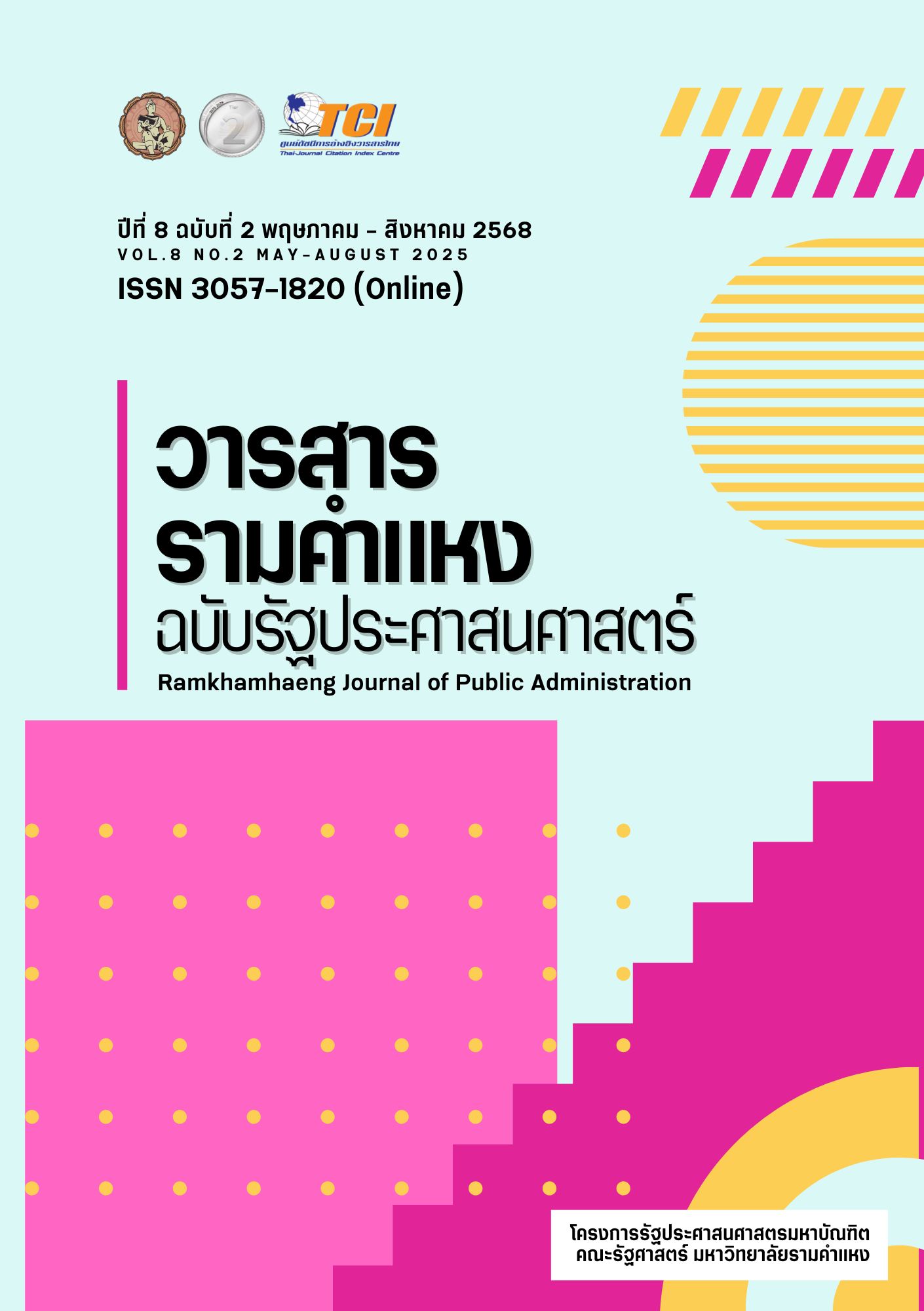Conceptual framework carbon credits management in promoting sustainable development
Keywords:
Carbon credits, management, sustainable developmentAbstract
This study aims to study a conceptual framework the of carbon credit management in promoting sustainable development. The study reviews literature from various sources, including academic articles, research papers, books, and textbooks. The results show that carbon credit management is a significant tool for promoting sustainable development. It has the primary goal of reducing greenhouse gas emissions and supporting the transition to a low-carbon economy includes: 1) An efficient carbon market mechanism 2) High-quality greenhouse gas reduction projects 3) Stakeholder participation 4) Effective governance 5) Knowledge and understanding 6) Technology and 7) International cooperation. These factors can be used for qualitative testing for organizations that focus on carbon credit management performance and prioritize organizational sustainability. To serve as a guideline for businesses to evaluate and improve their carbon credit management strategies towards sustainable operations, and as crucial information for the government in developing policies and mechanisms to effectively support carbon credit management at the national level.
References
Carbon Institute for Sustainability. (2023). Global and Thai Commitments to Net-zero Emissions. Retrieved February 15, 2024, https://cbis.institute/2023/04/19/carbon_neutrality/
Fayol, Henri. (1979). General and Industrial Management. London: Sir Isaac Pitman and Sons.
International Emissions Trading Association. (2020). The Role of Technology in Carbon Credit Markets: A Review of Current Trends and Future Opportunities. Retrieved February 15, 2024, https://irinagyurjinyan.wordpress.com/2022/04/12/%D1%83%D1%80%D0%BE%D0%BA-19
International Labour Organization. (2020). Just Transition: Work, Decent Jobs and the Climate Transition. Retrieved February 15, 2024, https://www.ilo.org/media/420401/download.
Intergovernmental Panel on Climate Change. (2018). Raising Public Awareness of Climate Change: A Review of Effective Communication Strategies. Retrieved February 15, 2024, https://www.ipcc.ch/site/assets/uploads/2017/08/Climate-Outreach-IPCC-communications-handbook.pdf
Joseph E. Aldy, Ian W. Horsch, and Austin M. Perry. (2016). The Impact of Carbon Markets on the Economy and the Environment. Retrieved February 15, 2024, https://www.sciencedirect.com/science/article/
abs/pii/S0959652622037908.
Mahidol University. (2023). Sustainable Development Goals (SDGs). Retrieved February 29, 2024, https://science.mahidol.ac.th/sdgs/
McKinsey Global Institute. (2008). The financial crisis and the future of global banking. McKinsey & Company.
OECD. (2018). Ensuring Environmental Integrity and Promoting Transparency in Carbon Markets. Retrieved February 15, 2024, https://www.oecd.org/en/networks/carbon-market-platform
Pana, T. (2023). Sustainable Growth Strategy of Medium-Sized Enterprise Operators in Bangkok Metropolitan Region. Journal of MCU Buddhapanya Review Vol. 8(6), pp. 173-185.
Pharit S. (2012). Education Management for Sustainable Development: Fundamentals of Social, Economic and Environmental Studies. Bangkok: Thai Sampan Printing.
Robbins, S.P. (2001). Organizational Behavior. (9thed.) Upper Saddle River, New Jersey, Prentice Hall.
TGO. (2023). A Practical Guide for Businesses to Achieve Net Zero Greenhouse Gas Emissions. Retrieved February 15, 2024, https://www.tgo.or.th/2023/index.php/th/
Umporn, M., Suchat, M., Prakrusuttakitsamosron and Chaiyut Inbua. (2023). The Sustainability of the Industrial Community AMID The Diversity of the Pattani Province. Journal of MCU Buddhapanya Review, 8(3), 277-286.
United Nations Environment Programme. (2016). The Paris Agreement: A Review of Key Issues and Future Directions. Retrieved February 15, 2024, https://unfccc.int/process-and-meetings/the-paris-agreement.
United Nations Environment Programme. (2019). Promoting Carbon Literacy: A Guide for Policymakers, Educators, and Media Professionals. Retrieved February 15, 2024, https://www.unep.org/resources/report/sustainable- consumption- and-production-handbook-policymakers.
United Nations Framework Convention on Climate Change. (2021). The Role of Governance in Climate Change Mitigation: A Review of Literature and Policy. Retrieved February 15, 2024, https://unfccc.int/
UNFCCC. (2023). Cooperative activities with United Nations entities and other intergovernmental organizations. Retrieved February 15, 2024, https://unfccc.int/topics/cooperative-activities-and-sdgs/cooperative-activities-with-united-nations-entities-and-other-intergovernmental-organizations.
William Nordhaus. (2015). Climate change and economic growth: A retrospective and prospective view. Retrieved February 15, 2024, https://williamnordhaus.com/publications.
World Resources Institute. (2019). Using Technology to Enhance Carbon Credit Project Monitoring and Verification. Retrieved February 15, 2024, https://www.wri.org/technical-perspectives/insider-3-tips-companies-navigating-use-carbon-credits-nature
World Bank. (2020). Building Capacity for Low-Carbon Development: A Review of Best Practices. Retrieved February 15, 2024, https://www.worldbank.org/en/topic/climatechange/overview
World Bank. (2021). Blockchain Technology for Carbon Markets: A Primer. Retrieved February 15, 2024, https://www.worldbank.org/en/topic/climatechange/brief/the-world-bank-engagement-roadmap-for-carbon-markets.
Downloads
Published
How to Cite
Issue
Section
Categories
License
Copyright (c) 2025 ปรัชญา ปัตถาวงศ์, เชาวฤทธิ์ เชาว์แสงรัตน์, ฟ้าใส สามารถ

This work is licensed under a Creative Commons Attribution-NonCommercial-NoDerivatives 4.0 International License.



